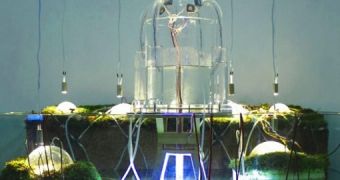We’ve reported on numerous occasions on how, as a result of phenomena such as global warming and climate change, most of the human communities presently inhabiting coastlines worldwide stand to hit some very rough patches, primarily as a result of rising oceans.
Given the fact that these shifts in global environmental conditions are already set in motion and, apart from slowing them down, little is left for environmentalists and conservationists to do, one team of researchers decided to find a way of making the most out of this new reality we are to soon be faced with.
Thus, they developed an ecosystem known as Networking Nature, which basically takes seawater and turns it into fresh one, all with the help of several solar-powered stills.
Inhabitat informs us that a series of small lamps is used to generate the heat needed in order for the seawater to turn into Steam, and that once this part of the process is completed, the fresh water is collected by means of condensation and made to serve various purposes.
According to the same source, the people behind this project wished to emphasize the fact that, regardless of numerous green-oriented campaigns, it will not be that long until coastlines begin to change and new ecosystems begin to take shape.
Apparently, this Networking Nature is intended to offer a solution to a potential global fresh water crisis long before the latter begins to manifest itself.
More so given the fact that, just like user-friendly energy grids, the Networking Nature can prioritize water demands and make sure the most pressing issues are the ones first and foremost dealt with.
“It's a Smart Water Network controlled by sensors that read the local lack of water and, through an Arduino board, activate the pumps providing the water where there is a peak of demand,” explains one researcher.
Furthermore, “The Smart Water Network will be a layer of the ecological network as well as the Smart Power Grid and the communications network. This strategy not only gives response to the preservation of the environment, but it is also a radically new model that ensures free and democratic access to the resources to everybody.”

 14 DAY TRIAL //
14 DAY TRIAL //